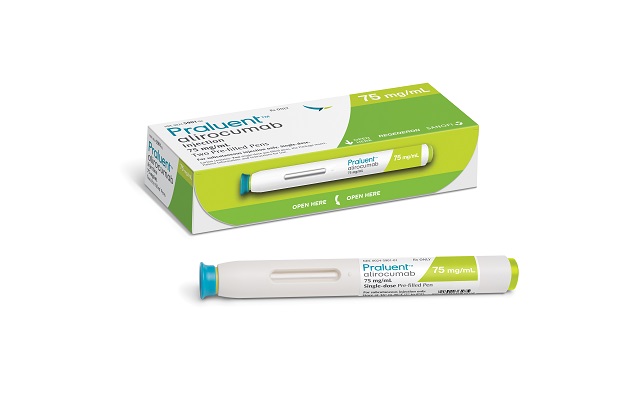
This image provided by Sanofi and Regeneron Pharmaceuticals on Friday, July 24, 2015 shows packaging for the drug Praluent. The Food and Drug Administration on Friday approved this first-of-a-kind medication that lowers artery-clogging cholesterol more than older drugs that have been prescribed for decades. But the drug’s high price tag – $14,600 per year – is certain to escalate debate about the cost of breakthrough drugs and who should take them. Sanofi and Regeneron Pharmaceuticals via AP
TRENTON, New Jersey — For the first time, there’s evidence that a diabetes medication, Jardiance, reduces risk of the complications that are the top killer of diabetics: heart attacks, strokes and other cardiovascular damage.
Preventing those is a long-elusive goal for the millions of diabetes patients and their doctors, and one analyst who’s also a trained physician even called Thursday’s news of a possible groundbreaking advance a “holy grail.”
Analysts are predicting a windfall for the makers of Jardiance, anticipating a big shift in which diabetes drugs doctors prescribe most. US investors liked the news, too, driving up Lilly shares more than 5 percent.
Jardiance, a once-a-day pill, was approved in the US last August for patients with Type 2, on noninsulin dependent, diabetes.
Despite the excitement, the drug’s two manufacturers — Eli Lilly and Co. of Indianapolis and German partner Boehringer Ingelheim GmbH — have announced only that a three-year study they conducted showed the drug delayed the time until patients died of cardiovascular disease or suffered a heart attack or stroke.
That brief summary, known as the top-line result, is meant to inform investors promptly that the closely watched study met its main goal, a result likely to affect Eli Lilly’s financial prospects and stock price.
“This could be important to patient care, but I think we should wait until the medical community digests” all the data, cautioned Dr. Thomas Seck, Boehringer Ingelheim’s US head of drug testing and medical affairs for metabolic disorders, which include diabetes.
Dr. Ananda Basu, a diabetes specialist at the Mayo Clinic, cautioned that it’s impossible to predict how patient treatment will be affected until details of the study design, the size of Jardiance’s benefits and any side effects are disclosed.
The two drugmakers plan to release detailed findings at a major diabetes conference in Europe on Sept. 17 and simultaneously publish them in a medical journal.
In the Jardiance study, the 7,000 patients were followed just over three years, on average. All were taking multiple standard medicines for diabetics, to control blood sugar, blood pressure and cholesterol levels. Half were given Jardiance pills and the other half dummy pills.
BernsteinResearch analyst Dr. Timothy Anderson wrote to investors that the positive result is a “holy grail of sorts” that should give Jardiance a competitive leg up. He wrote that he’d expected the trial to fail, and that the result was even more impressive because study participants were already on so many heart-protecting medicines. Anderson predicted Jardiance sales could hit $2 billion by 2020, twice what he’d expected, if the results are truly positive.
Lilly has reported just $30 million in sales for Jardiance in the first 6 months of this year, while privately held Boehringer Ingelheim hasn’t disclosed its take.
Analyst Seamus Fernandez of Leerink Swann also called the result a “surprise as no diabetes drugs, including insulin, have demonstrated (cardiovascular) benefit previously” over three years.
Dr. Vamil Divan, a Credit Suisse analyst, wrote that the result would cut into sales of Merck & Co.’s Januvia, which brings in $6 billion a year, and other medicines in the DPP-4 inhibitor class. Those control blood sugar by increasing the body’s insulin production, but only when blood sugar levels are too high.
Jardiance is part of a newer class of diabetes drugs called SGLT-2 inhibitors, which work by making the kidneys extract a significant amount of sugar from the blood to be excreted in urine.
For years, prescription pills and insulin and other injected medicines have helped diabetics control blood sugar levels and sometimes weight as well, together with regular exercise and a healthy diet. Most patients don’t manage their diabetes as well as they should, though, which generally shortens their lifespan after years of hefty medical bills.
Meanwhile, Type 2 diabetes in particular has become much more common, along with the obesity epidemic. Type 2, which about 95 percent of diabetics have, is usually linked to excess weight and a sedentary lifestyle. Nearly 30 million American adults and children — almost 10 percent of the population — have diabetes. An estimated 86 million more have prediabetes, and most will develop diabetes unless they take major, continuing steps to prevent that.